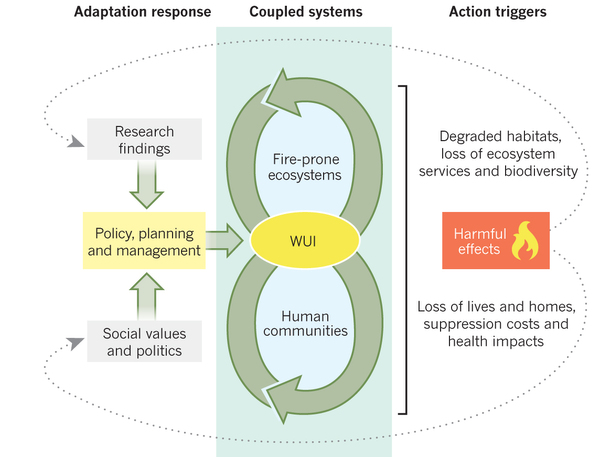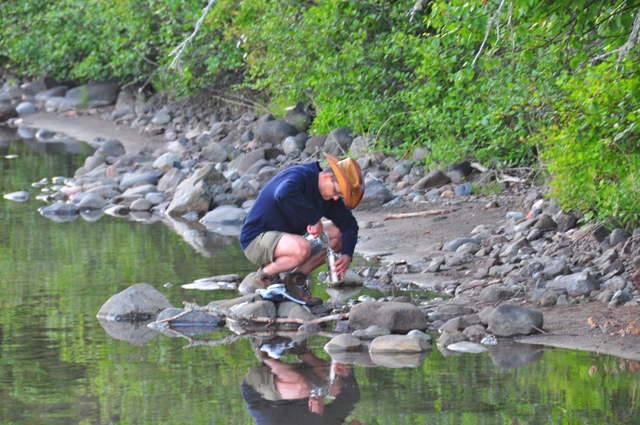General resilience
We need to increase society’s general resilience to shocks and disturbances. With that I mean that we need to increase communities capacity to adapt or transform in response to unfamiliar, unexpected and extreme shocks.
Extreme events have long lasting effects on society and need to be managed properly or major losses will be inevitable. Megadroughts in Syria and California, the rapid spread of wildfires in Indonesia and Canada or massive flooding in the UK and Denmark are just some examples of extreme events that we will have to get used to due to climate change and resource depletion. Other shocks may come from a fragile financial system in form of massive unemployment, from a dysfunctional political system that leads to a revolution or from mass migrations due to failed states.
Extreme events are notoriously difficult to predict because probabilities are hard to measure and uncertainties are high. That's why it's so important to take proactive measures to strengthen a society's general resilience to such events. This requires a complex systems perspective and understanding of human-nature interactions. Strengthening general resilience includes:
1. Diversity and redundancy

The important thing with diversity is that it can offer both
functional diversity and
response diversity. In other words, a diverse system can offer many different functions but also a diversity of responses to disturbances so that critical functions are maintained even if some parts of the system fail. For example, in a marine ecosystem some fish may carry out similar functions (e.g. grazing on corals) so that if one species disappears there is another that can keep on carry out the critical function for the benefit of the overall ecosystem. Similarly if a bridge or air plane has many backup safety mechanisms that all perform the same function (i.e.redundancy) the risk of a collapse or crash is much lower. This is also applicable to the economy where a diversity of many small companies with similar functions contributes to stability in case some should default. That's why it’s very unhealthy to have a few but major banks that can crash the entire system. It is also a reason why societies with high income inequality do poorly, because all the wealth has been concentrated at the top which creates instability and risk of revolution. Heterogeneous landscapes with high biodiversity have higher resilience to extreme events and so monocultures is a really bad idea since it increases vulnerability to massive crop failure, loss of pollinators, and spread of pests.
2. Modularity and Decentralisation
Connectivity can both be a good and a bad thing depending on degree. In today’s society we most often have a high degree of connectivity, international interdependence, that makes us vulnerable to the rapid spread of extreme events or cascading effects. Modularity helps contain disturbances to specific regions/sectors and lowers the risk of contagion. The more self-sufficient communities can be the better. Especially for the provision of essential goods and services such as water, food, energy and health care. Decentralised systems of decision making are also more flexible and can respond more rapidly to a crisis than any central control system ever can.
3. Reserves

As was common sense only two generations ago having reserves, no matter if it’s food or skills, contribute to a faster recovery after a disturbance. Just-in-time logistics make communities vulnerable to sudden shocks or major disturbances. So does a reliance on finite resources like oil. Keeping
strategic reserves while improving local supply or transitioning to renewables is increasingly important. We know that plants and animals that survive a disturbance are critical to ecological recovery from e.g. extraordinary fires or volcanic eruptions. Keeping
seed banks is also increasingly important as ever more species are lost.
Social memory is another important aspect that can help push for a faster recovery.
4. Manage feedbacks

To the extent it's possible society has to keep an eye on critical feedbacks and try to manage them so the system doesn’t cross thresholds that trigger harmful outcomes. For example, reducing waste and pollution and increasing recycling and use of biodegradable materials that can create
circular resource flows that restore balance. Applying a systems perspective is crucial to this aspect of general resilience.
Tighter feedbacks between e.g. producer and consumer makes feedbacks easier to manage. Local economies with proper incentives or sanctions on how to manage common pool resources can lead to more sustainable communities.
5. Monitoring
 Transparency
Transparency and up to date information about status and trends of ecosystem and social health is essential to maintain resilience over the long-term. Complex systems are not static but ever changing and so to provide
adaptive management one needs to constantly be learning and collecting information to ensure stability of the system. Citizen science and decentralised monitoring is much more effective and low cost than large-scale operations by central authorities. Traditional knowledge about changes over time is invaluable. Indicators can also help provide
early warnings of potential tipping points.
6. Trust and reciprocity

Trust is the basic glue that holds society together and it’s fundamental to everyday social and economic interactions. It is easier to maintain trust when groups are small and people know each other but harder in large communities and cities. When trust is high people are more willing to
cooperate and
transaction costs are low. This is yet another reason why decentralisation of decision-making is important. Today we live in a society where basic trust between actors has been replaced with money, but that monetary system is inherently unstable and increasingly untrustworthy. Trust takes a long time to build up but can be erased rapidly. When trust in a society is low transaction costs increase as fewer people are willing to cooperate or trade. The erosion of social trust is very damaging to a society that in the end may lead to bank runs, social unrest or even conflict.
.png)






- Episode 66: Inngruppa som styrende prinsipp i et bærekraftig demokrati:
ReplyDeletehttp://www.levevei.no/2013/02/episode-66-inngruppa-som-styrende-prinsipp-i-et-baerekraftig-samfunn/
The eco-municipality Hurdal, where they're building Hurdal ecovillage, says on TV they go for eco-sustainability because they want increased growth. Not because they want increased resilience. Wonder when people will understand that growth is out, and the only thing that matter from now on is resilience?
ReplyDeleteYes, people have a hard time understanding that physical things cannot grow forever. Ecosystems usually have a balance between efficiency and resilience but human societies only went for the first because of cheap energy.
ReplyDeleteI grunnen godt observert. Det finnes ikke fnugg av resiliens i vårt samfunnssystem. Vår sivilisasjon er som en kropp uten immunforsvar.
Delete